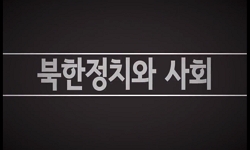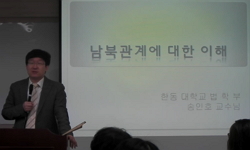On February 8th, 2018, a North Korean performance on visitation to South Korea was held for the first time in 15 years. The ‘Special Samjiyon Orchestra Performance for the Success of the Pyeongchang Winter Olympics·Paralympics’ of the North Korea...
http://chineseinput.net/에서 pinyin(병음)방식으로 중국어를 변환할 수 있습니다.
변환된 중국어를 복사하여 사용하시면 됩니다.
- 中文 을 입력하시려면 zhongwen을 입력하시고 space를누르시면됩니다.
- 北京 을 입력하시려면 beijing을 입력하시고 space를 누르시면 됩니다.

북한 삼지연관현악단 방남 공연에 대한 인식 유형 연구 : Q방법론적 접근 = A Study on Perception Types Regarding North Korean Samjiyon Orchestra Performances in South Korea :
한글로보기https://www.riss.kr/link?id=A106518397
-
저자
하승희 (북한대학원대학교)
- 발행기관
- 학술지명
- 권호사항
-
발행연도
2019
-
작성언어
Korean
-
주제어
North Korea ; Unification ; Samjiyon Orchestra ; Inter-Korean Musical Exchanges ; Q methodology ; 북한 ; 통일 ; 삼지연관현악단 ; 남북음악교류 ; Q방법론
-
등재정보
KCI등재
-
자료형태
학술저널
-
수록면
413-437(25쪽)
-
KCI 피인용횟수
0
- 제공처
-
0
상세조회 -
0
다운로드
부가정보
다국어 초록 (Multilingual Abstract)
This study is based on the reactions of the recipients of the North Korean performance. Perceptions of the North Korean performance were analyzed and typing was attempted regarding North Korean music performances using a Q Methodology on citizens who have watched the Samjiyon Orchestra Performance video. Presently, studies on North Korean music performances center on propaganda · agitation operation methods of music within North Korea and there is a lack of studies on recipients. This study narrows the breadth of awareness based on characteristics between the North and South and it may serve as base material in planning performances that can maximize the product of exchange in repertoire composition during future North and South Korean music exchange.
On February 8th, 2018, a North Korean performance on visitation to South Korea was held for the first time in 15 years. The ‘Special Samjiyon Orchestra Performance for the Success of the Pyeongchang Winter Olympics·Paralympics’ of the North Korean Arts Company, which was established at the start of the Pyeongchang Olympics, was even more meaningful because it was a performance held amongst an absence of social and cultural exchange following tight North and South Korean relations. While North and South Korean music exchange performances of the past were mostly traditional performances or North and South Korean joint orchestra performances, this performance was a popular music performance composed only of a North Korean repertoire, providing an understanding of North Korean music and culture, which had been unknown due to the absence of exchange.
This study is based on the reactions of the recipients of the North Korean performance. Perceptions of the North Korean performance were analyzed and typing was attempted regarding North Korean music performances using a Q Methodology on citizens who have watched the Samjiyon Orchestra Performance video. Presently, studies on North Korean music performances center on propaganda · agitation operation methods of music within North Korea and there is a lack of studies on recipients. This study narrows the breadth of awareness based on characteristics between the North and South and it may serve as base material in planning performances that can maximize the product of exchange in repertoire composition during future North and South Korean music exchange.
국문 초록 (Abstract)
연구 결과, 제1유형인 개방적 수용형에서는 북한이라는 대상 자체에 동질감을 느끼고 한민족으로서 우리와 다르지 않다고 느끼는 집단으로, 북한에 대해 다른 집단보다 거부감이 별로 없는 집단으로 나타났다. 제2유형인 비판적 수용형에서는 북한 공연에 대한 배경이나 행사 자체를 그대로 받아들이기보다 음악 자체의 평가에 집중하고 테크닉 적인 측면으로 분석하려는 특성이 높게 나타났다. 제3유형인 체제이미지 고착형에서는 북한 음악을 정치적 대상화함으로써 북한에 대한 이미지가 고착되어 있는 집단이라 할 수 있다.
향후 북한 교류 공연의 기획과 구성에서 남한 수용자들의 북한 공연에 대한 인식유형을 고려한다면, 보다 공감가능하고 현실에 맞는 교류형태를 구성할 수 있을 것이며, 향후 북한 콘텐츠를 바라보는 우리의 인식에서 콘텐츠 자체로서 즐기고 향유할 수 있는 인식의 유연성을 가지는 데 기여할 수 있다.
이 연구는 2018년 평창올림픽 계기로 이루어진 북한 예술단의 공연에 대한 수용자들의 반응을 살펴본 연구이다. 해당 공연은 그동안 경색된 남북관계에 따라 사회문화교류 자체가 전무했던 ...
이 연구는 2018년 평창올림픽 계기로 이루어진 북한 예술단의 공연에 대한 수용자들의 반응을 살펴본 연구이다. 해당 공연은 그동안 경색된 남북관계에 따라 사회문화교류 자체가 전무했던 속에서 성사된 공연이었기에 그간의 공백으로 알 수 없었던 북한의 음악과 문화를 이해할 수 있는 계기가 된다는 점에 의미가 있다. 연구는 Q방법론을 통해 삼지연관현악단 공연 영상을 시청한 국민을 대상으로 북한 음악공연에 대한 인식을 분석하고 유형화를 시도하였다.
연구 결과, 제1유형인 개방적 수용형에서는 북한이라는 대상 자체에 동질감을 느끼고 한민족으로서 우리와 다르지 않다고 느끼는 집단으로, 북한에 대해 다른 집단보다 거부감이 별로 없는 집단으로 나타났다. 제2유형인 비판적 수용형에서는 북한 공연에 대한 배경이나 행사 자체를 그대로 받아들이기보다 음악 자체의 평가에 집중하고 테크닉 적인 측면으로 분석하려는 특성이 높게 나타났다. 제3유형인 체제이미지 고착형에서는 북한 음악을 정치적 대상화함으로써 북한에 대한 이미지가 고착되어 있는 집단이라 할 수 있다.
향후 북한 교류 공연의 기획과 구성에서 남한 수용자들의 북한 공연에 대한 인식유형을 고려한다면, 보다 공감가능하고 현실에 맞는 교류형태를 구성할 수 있을 것이며, 향후 북한 콘텐츠를 바라보는 우리의 인식에서 콘텐츠 자체로서 즐기고 향유할 수 있는 인식의 유연성을 가지는 데 기여할 수 있다.
참고문헌 (Reference)
1 Song, Saem, "한반도 주변국에 대한 세대별 인식 차이 분석: 남남갈등과 세대갈등의 중첩 가능성 연구" Social Science Research Institute - Locality and Globality - Korean Journal of Social Sciences 43 (43): 117-141, 2019
2 이내영, "한국인의 통일의식의 결정요인: 새로운 분석모델의 모색" 평화와 민주주의연구소 22 (22): 167-206, 2014
3 최우선, "통일인식 차이의 원인: 합리주의적 설명" 아세아문제연구소 59 (59): 84-112, 2016
4 함인희, "집단별 통일의식 차이에 관한 연구:청소년 · 여성 · 386세대를 중심으로" 5 : 2000
5 이상훈, "전문성 발달에서 경험의 역할과 쟁점" 교육연구소 17 (17): 461-489, 2016
6 "유튜브 [90분 전체영상] 삼지연관현악단 특별 공연 ‘서울’"
7 이순모, "위협적 메시지에 대한 주관적 인식 유형 - 최근 한반도 정세 관련 보도의 Q방법론적 분석-" 한국엔터프라이즈아키텍처학회 10 (10): 223-236, 2013
8 이문학, "북한출판물에 대한 수용자들의 인식 유형에 관한 연구" 한국주관성연구학회 (38) : 165-181, 2017
9 한민, "북한에 대한 이중적 이미지와 통일 인식" 1 : 2005
10 은종환, "북한 핵위협 및 그 대응 방안에 대한 인식유형 연구 - Q 방법론을 중심으로 -" 위기관리 이론과 실천 11 (11): 95-118, 2015
1 Song, Saem, "한반도 주변국에 대한 세대별 인식 차이 분석: 남남갈등과 세대갈등의 중첩 가능성 연구" Social Science Research Institute - Locality and Globality - Korean Journal of Social Sciences 43 (43): 117-141, 2019
2 이내영, "한국인의 통일의식의 결정요인: 새로운 분석모델의 모색" 평화와 민주주의연구소 22 (22): 167-206, 2014
3 최우선, "통일인식 차이의 원인: 합리주의적 설명" 아세아문제연구소 59 (59): 84-112, 2016
4 함인희, "집단별 통일의식 차이에 관한 연구:청소년 · 여성 · 386세대를 중심으로" 5 : 2000
5 이상훈, "전문성 발달에서 경험의 역할과 쟁점" 교육연구소 17 (17): 461-489, 2016
6 "유튜브 [90분 전체영상] 삼지연관현악단 특별 공연 ‘서울’"
7 이순모, "위협적 메시지에 대한 주관적 인식 유형 - 최근 한반도 정세 관련 보도의 Q방법론적 분석-" 한국엔터프라이즈아키텍처학회 10 (10): 223-236, 2013
8 이문학, "북한출판물에 대한 수용자들의 인식 유형에 관한 연구" 한국주관성연구학회 (38) : 165-181, 2017
9 한민, "북한에 대한 이중적 이미지와 통일 인식" 1 : 2005
10 은종환, "북한 핵위협 및 그 대응 방안에 대한 인식유형 연구 - Q 방법론을 중심으로 -" 위기관리 이론과 실천 11 (11): 95-118, 2015
11 황상민, "북한 ‘김정은’에 대한 남한 사람들의 인식 탐색" 2015
12 유재두, "대학생의 안보의식과 북한 테러에 대한 인식 관계" 한국테러학회 7 (7): 112-135, 2014
13 김재기, "대학생들의 북한 및 통일에 대한 인식과 통일교육 활성화 방안-전남대 학생 254명의 사례-" 한국시민윤리학회 26 (26): 75-91, 2013
14 한국예술종합학교 한국예술연구소, "남북한 공연예술의 대화" 시공사 2003
15 김성섭, "금강산 관광사업에 대한 시민인식 분석" 한국관광학회 28 (28): 283-298, 2004
16 권영승, "글로벌 · 다문화 사회의 통일의식: N세대 대학생을 중심으로" 1 (1): 2011
17 배인교, "Trend and Direction of Inter-Korean Music Exchange" Institute for Peace and Unification Studies Seoul National University 10 (10): 39-80, 2018
18 Dongsuk Jang, "The relationship between awareness of Korean unification and cognition of North Korean tourism" Korea Tourism Research Association 32 (32): 111-122, 2018
19 이제영, "Q의 의미" 시간의 물레 2004
20 김순은, "Q방법론과 사회과학" 금정 2007
21 Simon Watts, "Q방법론 연구의 실행: 이론 · 방법 · 해석" 커뮤니케이션북스 2014
22 김흥규, "Q방법론 : 과학철학, 이론, 분석 그리고 적용" 커뮤니케이션북스 2008
23 Brown, S. R., "Political Subjectivity: Applications of Q Methodology in Political Science. New Haven" Yale University Press 1980
24 김병조, "Korean Perception to the Unification during 2007~2015: Focused on Generation Gap and Intra-Generation Differentiation" Institute for Peace and Unification Studies Seoul National University 7 (7): 3-41, 2015
25 정동준, "KINU 통일의식조사 2018: 남북평화 시대의 통일" 통일연구원 2018
26 Heuijeong Kim, "A Study on the Opinions Towards Unification by Generation and Unification Education: Focusing on Unification Perception Survey" Asia Culture Academy of Incorporated Association 9 (9): 1643-1654, 2018
27 이상신, "A Study on National Image of North Korea: Perception of North Korea and South-South Conflicts" 21st Century Political Science Association 24 (24): 187-216, 2014
28 Hee Sun Shin, "A Research for Development of Unification Education in the University – A Study Based on University Students’ Awareness of Unification Education" The Korean Association of Ethics 1 (1): 327-357, 2015
동일학술지(권/호) 다른 논문
-
- 북한연구학회
- 윤영상
- 2019
- KCI등재
-
- 북한연구학회
- 김연수
- 2019
- KCI등재
-
- 북한연구학회
- 김희정
- 2019
- KCI등재
-
- 북한연구학회
- 김성주
- 2019
- KCI등재
분석정보
인용정보 인용지수 설명보기
학술지 이력
| 연월일 | 이력구분 | 이력상세 | 등재구분 |
|---|---|---|---|
| 2026 | 평가예정 | 재인증평가 신청대상 (재인증) | |
| 2020-01-01 | 평가 | 등재학술지 유지 (재인증) |  |
| 2017-01-01 | 평가 | 등재학술지 유지 (계속평가) |  |
| 2013-01-01 | 평가 | 등재학술지 유지 (등재유지) |  |
| 2010-01-01 | 평가 | 등재학술지 선정 (등재후보2차) |  |
| 2009-01-01 | 평가 | 등재후보 1차 PASS (등재후보1차) |  |
| 2008-01-01 | 평가 | 등재후보학술지 유지 (등재후보1차) |  |
| 2007-01-01 | 평가 | 등재후보학술지 유지 (등재후보1차) |  |
| 2006-01-01 | 평가 | 등재후보 1차 FAIL (등재후보2차) |  |
| 2005-01-01 | 평가 | 등재후보 1차 PASS (등재후보1차) |  |
| 2004-01-01 | 평가 | 등재후보 1차 FAIL (등재후보1차) |  |
| 2003-01-01 | 평가 | 등재후보학술지 선정 (신규평가) |  |
학술지 인용정보
| 기준연도 | WOS-KCI 통합IF(2년) | KCIF(2년) | KCIF(3년) |
|---|---|---|---|
| 2016 | 1.32 | 1.32 | 1.3 |
| KCIF(4년) | KCIF(5년) | 중심성지수(3년) | 즉시성지수 |
| 1.12 | 1.1 | 1.848 | 0 |




 KISS
KISS






